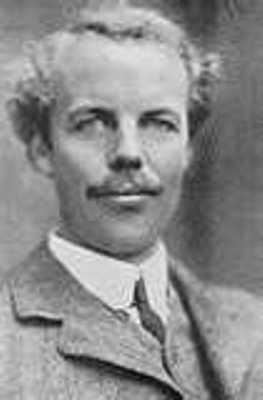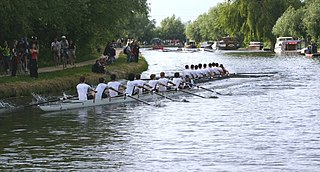Related Research Articles
Economics is a social science that studies the production, distribution, and consumption of goods and services.

The University of Cambridge is composed of 31 colleges in addition to the academic departments and administration of the central university. Until the mid-19th century, both Cambridge and Oxford comprised a group of colleges with a small central university administration, rather than universities in the common sense. Cambridge's colleges are communities of students, academics and staff – an environment in which generations and academic disciplines are able to mix, with both students and fellows experiencing "the breadth and excellence of a top University at an intimate level".
An economist is a professional and practitioner in the social science discipline of economics.

Arthur Cecil Pigou was an English economist. As a teacher and builder of the School of Economics at the University of Cambridge, he trained and influenced many Cambridge economists who went on to take chairs of economics around the world. His work covered various fields of economics, particularly welfare economics, but also included business cycle theory, unemployment, public finance, index numbers, and measurement of national output. His reputation was affected adversely by influential economic writers who used his work as the basis on which to define their own opposing views. He reluctantly served on several public committees, including the Cunliffe Committee and the 1919 Royal Commission on income tax.

Joan Violet Robinson was a British economist known for her wide-ranging contributions to economic theory. One of the most prominent economists of the century, Joan Robinson incarnated the "Cambridge School" in most of its guises in the 20th century: she started as a cutting-edge Marshallian and after 1936; as one of the earliest and most ardent Keynesians and finally as one of the leaders of the Neo-Ricardian and Post Keynesian schools. Robinson's contributions to economics are far too numerous to elucidate fairly. Unlike most economists, she was not a "one idea" person, but rather made many many fundamental contributions to very different areas of economics. Robinson studied Karl Marx, later becoming a Maoist, and was a central figure in what became known as post-Keynesian economics.

A May Ball is a ball at the end of the academic year that takes place at any of the colleges of the University of Cambridge. They are elaborate and lavish formal affairs, requiring black tie or sometimes white tie, with ticket prices ranging from around £100 to as much as £640 for a pair of dining tickets at Trinity. May Ball budgets can exceed £100,000; a report by the student newspaper Varsity in 2016 found that the budget for the 2015 Trinity ball was £286,000. The balls are held in the colleges, starting around from 6-9 p.m. and lasting until well after dawn. "Survivors photographs" are taken of those who last until morning. Other colleges frequently hold winter balls, such as the popular Selwyn Snowball, who recently had acts such Tinchy Stryder and Mumford and Sons headlining.

The Ascension Parish Burial Ground, formerly known as the burial ground for the parish of St Giles and St Peter's, is a cemetery off Huntingdon Road in Cambridge, England. Many notable University of Cambridge academics are buried there, including three Nobel Prize winners.

The May Bumps are a set of rowing races, held annually on the River Cam in Cambridge, England. They began in 1887 after separating from the Lent Bumps, the equivalent bumping races held at the end of February or start of March. Prior to the separation there had been a single set of annual bumps dating from its inception in 1827. The races are open to all college boat clubs from the University of Cambridge, the University Medical and Veterinary Schools and the Anglia Ruskin Boat Club. The May Bumps takes place over four days in mid-June and is run as a bumps race.
The Chancellor's Gold Medal is a prestigious annual award at Cambridge University for poetry, paralleling Oxford University's Newdigate Prize. It was first presented by Prince William Frederick, Duke of Gloucester and Edinburgh during his time as Chancellor of the University of Cambridge. In the mid 19th century, the topic for each year was sent out at the end of Michaelmas Term, with a requirement that entries were submitted by 31 March of the following year. A second requirement is and has been that poems must be submitted anonymously. Over the last few decades the system of set topics has been abandoned.

The Lent Bumps 2011 was a series of rowing races being held at Cambridge University from Tuesday 1 March 2011 until Saturday 5 March 2011. The event was run as a bumps race and is the 124th set of races in the series of Lent Bumps which have been held annually in late-February or early March in this form since 1887. See Lent Bumps for the format of the races. In 2011, 121 crews took part, with nearly 1100 participants in total.

The Lent Bumps 2012 was a series of rowing races at Cambridge University from Tuesday 28 February 2012 to Saturday 3 March 2012. The event was run as a bumps race and was the 125th set of races in the series of Lent Bumps which have been held annually in late February or early March since 1887. See Lent Bumps for the format of the races. 121 crews took part, with nearly 1100 participants in total.
The Thomas Bond Sprague Prize is a prize awarded annually to the student or students showing the greatest distinction in actuarial science, finance, insurance, mathematics of operational research, probability, risk and statistics in the Master of Mathematics/Master of Advanced Studies examinations of the University of Cambridge, also known as Part III of the Mathematical Tripos. The prize is named after Thomas Bond Sprague, the only person to have been president of both the Institute of Actuaries in London and the Faculty of Actuaries in Edinburgh. It is awarded by the Rollo Davidson Trust of Churchill College, Cambridge, following a donation by D. O. Forfar, MA, FFA, FRSE, former Appointed Actuary of Scottish Widows.
The Lent Bumps 2013 was a series of rowing races at Cambridge University from Tuesday 26 February 2013 to Saturday 2 March 2013. The event was run as a bumps race and was the 126th set of races in the series of Lent Bumps which have been held annually in late February or early March since 1887. See Lent Bumps for the format of the races. 121 crews took part, with nearly 1100 participants in total.
The Lent Bumps 2014 was a series of rowing races at Cambridge University from Tuesday 25 February 2014 to Saturday 1 March 2014. The event was run as a bumps race and was the 127th set of races in the series of Lent Bumps which have been held annually in late February or early March since 1887. See Lent Bumps for the format of the races. 103 crews took part, with nearly 950 participants in total.
The Department of Economics is an academic department of the University of Oxford within the Social Sciences Division. Relatively recently founded in 1999, the department is located in the Norman Foster-designed Manor Road Building.
The May Bumps 2021 were a set of rowing races at Cambridge University scheduled to take place from Wednesday 16 June 2021 to Saturday 19 June 2021. The event was to be run as a bumps race and would have been the 129th set of races in the series of May Bumps which had been held annually in mid-June since 1887. In this edition of the Mays, the women's divisions were due to be raced before the equivalent men's divisions.